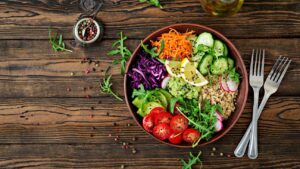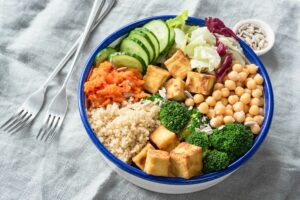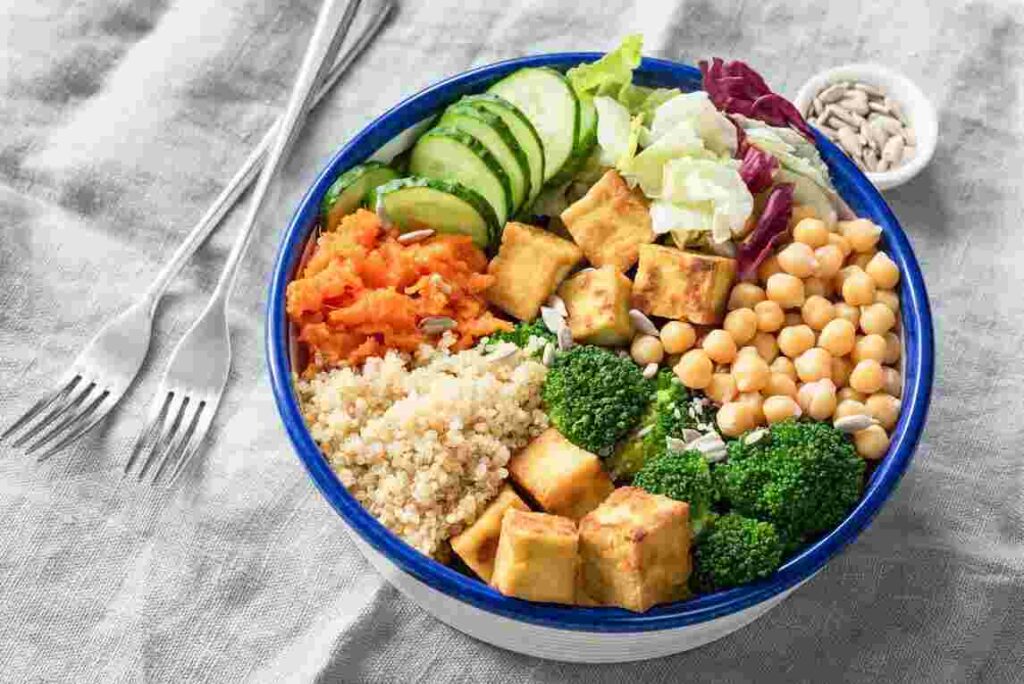Weight loss is a journey that requires dedication and commitment. For those who prefer to remain vegetarian, the challenge can feel even more daunting. With all of the different diets out there, it’s hard to know which one will work for you. Luckily, vegetarian weight-loss plans are becoming increasingly popular and accessible. In this blog post, we will explore how vegetarians can successfully lose weight and keep it off. We’ll discuss the health benefits of a vegetarian diet and provide tips for creating a balanced meal plan for long-term success. So if you’re ready to make changes in your lifestyle that promote healthy weight loss, read on!
Contents
What is a Vegetarian Diet?

There are many different types of vegetarian diets, but they all have one thing in common: they don’t include meat. Some vegetarians also avoid dairy and eggs, while others may eat them in moderation.
A vegetarian diet can be a healthy way to lose weight, as long as you’re eating the right foods. Fill up on high-fiber vegetables and fruits, whole grains, and legumes. These foods are filling and will help you reach your calorie goals without feeling deprived.
Avoid processed foods, sugary drinks, and excessive amounts of saturated fat from oils and animal products. These can lead to weight gain and health problems down the road. If you’re not sure where to start, talk to a registered dietitian who can help you create a balanced vegetarian meal plan.
The Benefits of a Vegetarian Diet
There are numerous health benefits associated with adopting a vegetarian diet.
Studies have shown that vegetarians tend to have lower cholesterol levels and are less likely to develop heart disease, Type 2 diabetes, and certain types of cancer than non-vegetarians. Additionally, plant-based diets are typically high in fiber, vitamins, minerals, and antioxidants which can help protect against disease and promote overall health.
Some of the other benefits of a vegetarian diet include improved digestion, weight loss or maintenance, increased energy levels, and a reduced risk of food-borne illnesses. A vegetarian diet is also more sustainable than an animal-based diet as it requires fewer resources to produce and has a lower environmental impact.
Ultimately, the benefits of a vegetarian diet are numerous and can provide long-term health benefits and a more sustainable lifestyle. For those looking to make positive changes in their diet, reducing or eliminating animal products is one of the easiest and most beneficial steps that can be taken.
The Best Vegetables For Weight Loss

If you’re looking to slim down, you may want to consider adding more vegetables to your diet. While all vegetables are healthy, some are especially beneficial for weight loss. These include leafy greens, broccoli, Brussels sprouts, cabbage, cauliflower, and cucumber.
Leafy greens such as spinach and kale are low in calories but high in nutrients. They’re also a great source of fiber, which can help you feel full and promote weight loss. Broccoli, Brussels sprouts, and cabbage are also rich in fiber and nutrients. Cauliflower is a low-calorie vegetable that’s often used as a replacement for higher-calorie foods like rice or potatoes. And cucumbers are refreshing and hydrating – perfect for helping to keep your hunger at bay.
Some of the other vegetables that are great for weight loss include asparagus, bell peppers, celery, eggplant, mushrooms, onions, and tomatoes. These vegetables are low in calories but high in essential vitamins and minerals. They’re also a good source of filling fiber.
When preparing vegetables for weight loss, it’s important to choose healthy cooking methods like baking, grilling, stir-frying and steaming. Avoid adding unhealthy fats like butter or oil when cooking vegetables to keep them low in calories.
Other Weight Loss Tips for Vegetarians

In addition to the weight loss tips mentioned above, here are a few more ideas for vegetarian weight loss:
Cut Down On Processed Foods
One of the best ways to lose weight as a vegetarian is to cut down on processed foods. Processed foods are often high in calories and low in nutrition, making them a poor choice for anyone trying to lose weight. Instead, opt for fresh fruits and vegetables, whole grains, legumes, nuts, and seeds. Sometimes, a bit of prep work is necessary to make healthier meals, but the results are worth it.
Increase Fiber Intake
Another great way for vegetarians to lose weight is by increasing their fiber intake. Fiber helps keep you full and can help promote weight loss. Good sources of fiber include legumes, whole grains, nuts, and seeds. Try to get at least 25-30 grams of fiber each day from these foods and other plant-based sources.
Drink Plenty of Water
Staying properly hydrated is essential for overall health as well as weight loss. Aim to drink at least 64 ounces of water each day to stay hydrated and curb cravings. Drinking enough water will also help keep you from feeling overly hungry or thirsty.
Get Enough Sleep
Getting enough sleep is an often overlooked aspect of health and weight loss. Research has shown that getting seven to nine hours of sleep per night can help with weight loss as well as reduce cravings and boost metabolism. Additionally, make sure you are giving your body the rest it needs by taking regular breaks throughout the day.
Stay Active
Staying active is another important factor in any weight loss plan. Regular physical activity will not only help burn calories, but it can also help improve mood, energy levels, and overall well-being. Try to aim for at least 30 minutes of moderate exercise each day. This can include walking, jogging, biking, swimming, or any other activity that gets your heart rate up.
Increase Your Protein Intake
Protein is an important macronutrient that can help you feel fuller and longer and provide your body with the essential amino acids it needs to build muscle. Good sources of vegetarian protein include beans, lentils, tofu, tempeh, seitan, nuts, and seeds. The proline content of these items is especially important for vegetarians, so make sure to include them in your daily diet.
Reduce Your Portion Sizes
Another simple way to cut calories is by reducing portion sizes. Eating smaller meals will help you reduce calorie intake while still feeling satisfied. Try to aim for small portions of lean proteins, complex carbs, and healthy fats at every meal.
These are just a few tips that can help vegetarians lose weight and keep it off long-term. With some simple lifestyle changes, you can be well on your way to reaching your weight loss goals in no time.
Conclusion
A vegetarian diet is a great way to lose weight healthily and sustainably. It can be tailored to fit any lifestyle, budget, or food preference. With the right planning and commitment, you can enjoy delicious meals that are also good for your health. By focusing on whole foods and limiting processed items, you will have more energy throughout the day while maintaining healthy eating habits. Remember that weight loss takes time but with dedication and practice it can be achieved enjoyably.
Consider contacting FitMantra for additional information on nutrition and fitness. You can also get in touch with their nutrition experts through our online nutrition counseling, who can guide you through the process and help you achieve your fitness goals. You can also lose weight with the help of our weight loss program. Download our Fitness app on Android to learn more about us.
